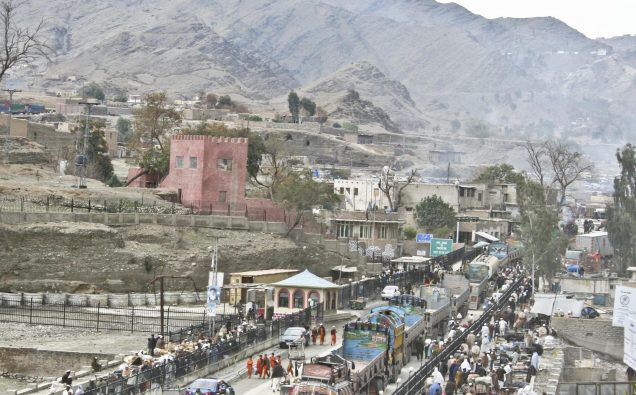
A view into Pakistan from the Afghan border at Torkham Gate. Photo Staff Sgt. Ryan Matson (U.S. Armed Forces) via Wikimedia Commons
Pakistan reopened border crossings with Afghanistan on humanitarian grounds, more than a month after they were closed following deadly bombings on Pakistani cities, which were traced backed to Afghanistan-based terrorists.
Islamabad sealed the Torkham and Chaman crossings on February 16 after a faction of the Pakistani Taliban – pushed out of the tribal areas but now operating from their strongholds in Afghanistan – claimed responsibility for killing more than 130 citizens.
The closure of the border left hundreds of thousands of people and lorries carrying food and other goods to landlocked Afghanistan remained stuck at the two major crossings of Torkham and Chamman.
“We have taken this decision on humanitarian grounds,” a statement from Prime Minister Nawaz Sharif’s office said on Monday.
The statement said that, while the government had evidence that “anti-Pakistan elements” were operating from the Afghan soil, keeping the border closed was against the interests of ordinary people.
“We hope that the Afghan government will take all necessary steps to prevent the reasons why we undertook these steps [of closing the border] from recurring,” it said.
Pakistan had temporarily reopened the border crossings for two days on March 7 and 8, to allow visitors with valid visas on both sides to return home.
Meanwhile, Pakistan’s Minister of Defense Khawaja Asif says the border has been used “as a thoroughfare” by Pakistani Taliban fighters.
Trade Minister Khurram Dastagir said that Pakistan was aware of sufferings of Afghan traders. But they should also understand the agonies of citizens of Lahore and Sehwan Sharif who lost their near and dear ones due to suicide bombings.
Managing the restive border – running for more than 2600 kms – has long been a headache for the two countries as militants use it for illegal movement. Torkham and Chaman crossings are major arteries for around $1.5bn in trade and commerce between the two neighbours.
Estimates say around 15,000 Afghans use the the Torkham crossing every day.
Repeated closures of border avenues have badly hurt the bilateral commerce over the last two years, with the total volume of Pak-Afghan trade shrinking from a size of US $ 2.5 billion to US $ 1.3 billion.
The Afghan exporters have been particularly hit hard as Pakistan’s fruit shops have been without Kandhari pomegranates and Afghan apples for consecutive second year. Iran and other countries are filling the gap.

















